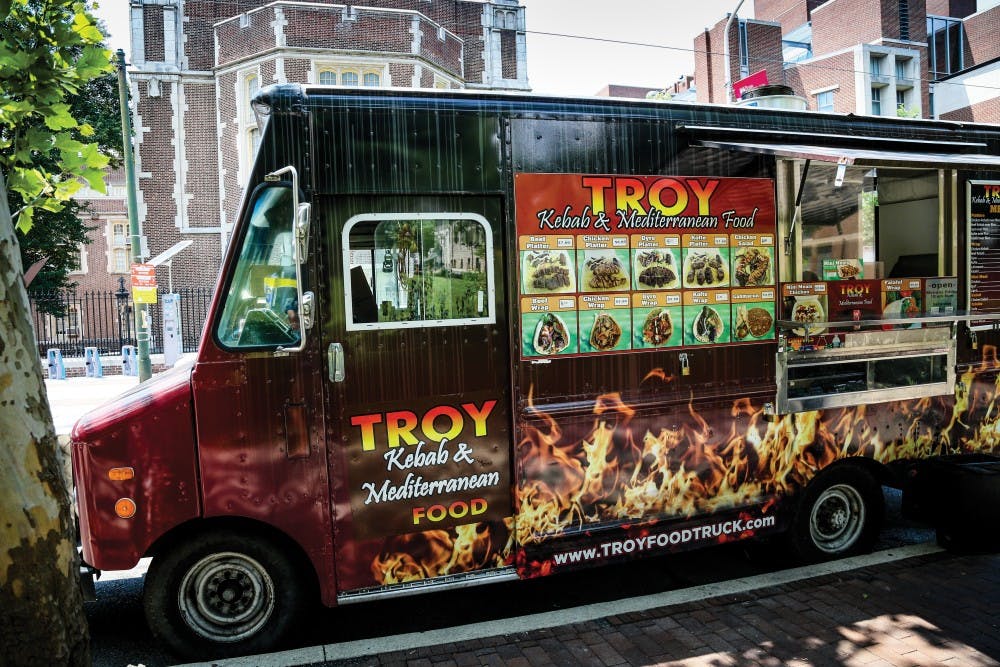
On 40th and Locust streets, Sadik Karakulak leans over the front window of his food truck and hands a fresh order of falafel to his third customer in the last 10 minutes. He removes his gloves, checks his phone and returns to the front of the truck.
“You were asking about my biggest challenge, right? For me, it’s managing my two businesses,” says the Turkish owner of Troy Food Truck, which serves Mediterranean food on campus. Karakulak also manages a Mexican food cart at 38th and Spruce streets.
For Karakulak, getting his two businesses off the ground was an even bigger challenge that entailed capital investments, countless permits and, most importantly, patience.
Not anyone can pull up a truck and sell their cuisine at Penn. To be a mobile food vendor at University City, prospective food truck operators have to apply for a location permit through the Philadelphia government. Food truckers are put on a waiting list and are notified when designated spots open up around campus. That notification can take time.
“I waited over two years for this spot, but now the waiting list is even longer,” Karakulak says, who has been serving gyros and falafels to Penn students and faculty for almost four years now.
Karakulak’s two-year wait was well worth it since it guaranteed him one of only two spots on 40th Street between Spruce and Walnut streets. Once a food truck gets a location permit in University City, it can maintain its spot by paying an annual renewal fee. For Troy, that means paying a yearly $3,500 for its sought-after location.
To avoid paying such a hefty fee, some owners decide to do business on food carts rather than food trucks. Food carts are usually smaller, cheaper to buy, pay lower fees for location permits and are easily towed by a motorized vehicle.
“I started with a food cart because it requires less money to start off. When you start you don’t have a lot to invest with. I started with this and am comfortable like this,” says Leo Saavedra, owner of Tacos Don Memo at 38th Street between Spruce and Locust streets.
The limited amount of designated spots on campus coupled with a growing food truck industry has made the waiting list longer and more competitive. Saavedra explained how it took him only three months to get a location permit on 38th and Sansom streets seven years ago. However, two years ago when he decided to apply for his current spot, he was on the waiting list for over a year and a half.
As if investing in a food cart or truck and waiting years on a location permit isn’t enough, mobile food vendors have to wade through a bureaucracy of city license applications before starting business. A Unit Plan Review, a Food Safety Certification, a Commercial Activity License and a Vendor Motor Vehicle License are just some of the many licenses that vendors have to apply and pay for before starting their businesses. This process involves going to multiple city offices, waiting months for responses and paying hundreds of dollars in fees.
“It’s definitely a costly endeavor. Your truck has to pass inspection, your registration, your insurance. None of this is cheap. There are a lot of costs that go into this before you sell a single entree,” President of the Philly Mobile Food Association Rob Mitchell said.
The PMFA has been at the forefront of some recent triumphs for the food truck industry in City Council. One frustrating obstacle for any reform to take place was the fact that there was not a distinct definition for food trucks and carts. Instead, they were grouped into the city’s antiquated definition of a “street vendor,” which includes “wagons,” “handcarts” and “hawkers” among other archaic descriptions.
This all changed on May 5 when Mayor Michael Nutter signed Bill 150056 into law, which defined food trucks and carts as “mobile food vendors.”
“The most important part of this law is that it validated us. By giving us our own definition, it recognized us as a legitimate thriving industry in the city,” Mitchell said, who worked with the City Council to get the bill passed.
The bill did not stop at a technical definition. It also made changes to the city’s restrictive zone permit regulations. The ordinance now allows mobile food vendors to legally operate in private lots. This update is a significant win for the industry, given that food trucks are prohibited on virtually any street in Center City and food carts are only permitted on some sidewalks. Operating in privately owned lots provides an opportunity for vendors to gain access to the more restricted areas of the city by setting up contracts with property owners.
The new ordinance might provide a channel for prospective food trucks to bypass the long waiting list for a location permit in University City by dealing directly with lot owners in the surrounding areas.
For now, however, Karakulak and Saavedra are more focused on getting by the slow summer months at Penn. Both indicated that their sales dramatically decrease by more than 50 percent while the University is not in session. It’s an expected loss that they account for and more than make up for with sales during the academic year.
The Troy Food Truck owner is not worried. “Business slows down, so I’ll probably go on vacation, too. We know these times are slow, so it gives me time to relax a bit,” he says before returning to the back of his truck to serve another customer.
The Daily Pennsylvanian is an independent, student-run newspaper. Please consider making a donation to support the coverage that shapes the University. Your generosity ensures a future of strong journalism at Penn.
DonatePlease note All comments are eligible for publication in The Daily Pennsylvanian.








